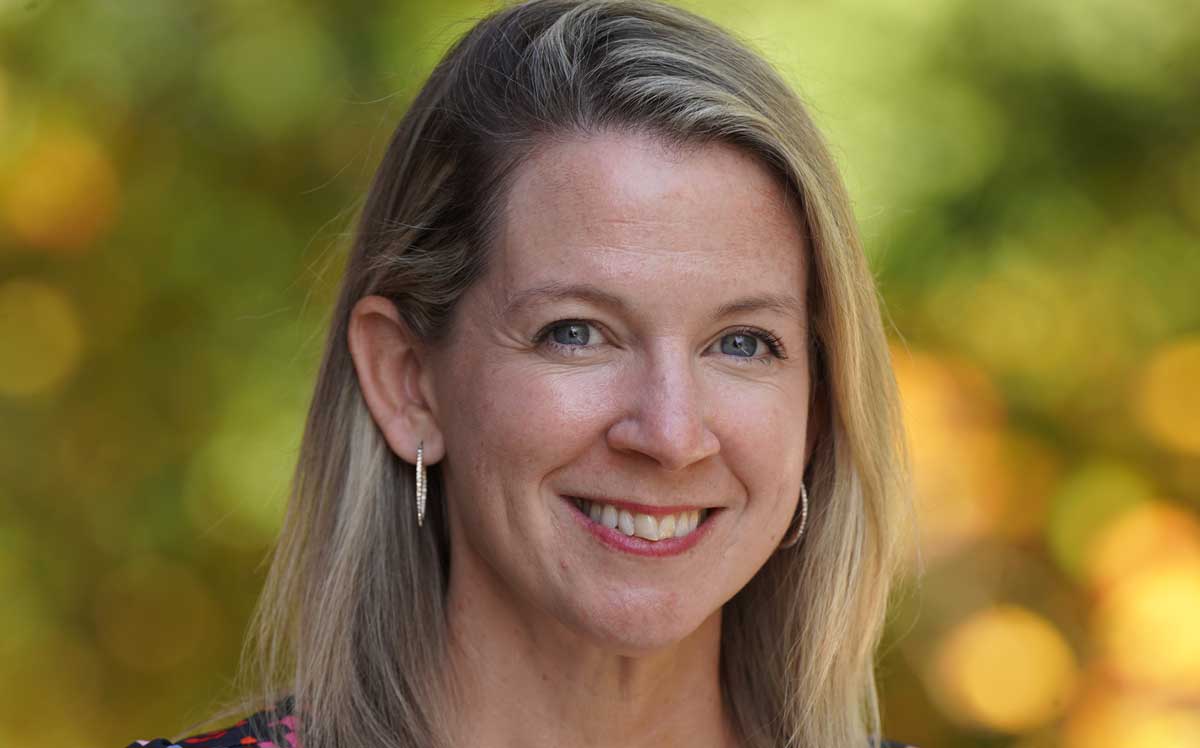Please introduce yourself, your professional background, and how you came to D-E!
My name is Deirdre O’Malley. I am a clinical psychologist, and I’m the Director of Counseling Services. I’ve been a psychologist at the Upper School for the last 15 years. I came to D-E after working in public schools and in private practice. I’ve continued private practice, but most of my focus has really been in schools and in education.
What are your primary responsibilities and what does an average day look like for you?
The average day is always different! There really is no average day. One of my primary responsibilities is to provide individual counseling to students. I also often work in collaboration with families and parents/guardians, about how to support their kids. I teach a mental health seminar class with 10th Graders. That’s a class that I developed with Psychology faculty member Dr. Danny Carragher. All 10th Graders take a class with us in which we talk about what mental health is and the stigma around it and try to give some concrete tools about how they can help their own mental health.
I also consult with deans, principals and teachers. I do training for teachers about how to help and support kids and how to help their whole social-emotional being. That’s the crux of it.
Let’s say you have a student who is going through a hard time and needs adult support. What are the processes and procedures to provide the appropriate care?
Every student is different. One of the things that happens is we meet together as what we refer to as the D-E Student Support Team (SST), once a week for each grade level. The SST is made up of the psychologists and learning specialists and the Class Dean. And in that meeting, we’re often trying to get information about a student so we can understand them and who they are, who they might feel are their good supports.
Anyone is welcome to get counseling here in the office. We also offer to make referrals for outside providers. So really, depending on where the students need it, we try to individualize it for that particular student. Maybe for one student, they’re feeling comfortable coming in and you know, getting counseling here. We might consult from afar with their advisor or a teacher and somebody else who might be helping the family get into some kind of specialized therapy for that child’s mental health.
How do you work with parents/guardians? What are the most frequent questions you receive?
I think one of the questions we often hear is “Is this normal [for my child]?” Teenage emotions are often super intense. Frequently, what can seem really extreme at home – whether it involves kids feeling anxiety or acting out at home or not speaking to parents – can be normal. I think a lot of parents want to know whether this is something that’s more typical for a teenager or if it’s something that needs an intervention. So a lot of times I think it’s just trying to help normalize what is normal, and then address what might be something that needs more professional follow-up.
What do you hear most frequently about what’s on students’ minds?
By far the most common topics that most kids are feeling are the anxiety and pressure of going to a competitive school and just in general! There’s a mental health crisis in teenagers and kids in this country, and we’re certainly not immune to any of that. I think kids often feel from a very young age a certain amount of pressure to perform, and to keep performing and to do things in a way that are going to make people proud, whether it’s for their teachers or their families. That can create a lot of pressure.
A lot of kids talk about not wanting to be a burden to others, and they feel like they need to hold it all on their own. That’s a really common theme that I feel like I often talk about with kids about how, when they test it out, people are often way more willing to help and to listen. But oftentimes, teenagers can have a sense that they’re supposed to be doing it on their own.
What do you observe as skills that students need to practice?
One thing that I’ve definitely seen is that because kids have access to so many forms of entertainment and distraction, including cellphones among other things, kids are way less tolerant of having difficult emotions. So whereas we used to have to live in an uncomfortable place sometimes if you were waiting for the bus or in a party where you weren’t feeling so socially acceptable, you essentially had to just be with those feelings and you develop skills to tolerate them. I think now being able to distract ourselves so easily makes it so that when kids have intense feelings, they find those feelings to be really alarming. And sometimes they can find those emotions intolerable, and that makes it harder sometimes for them to interact with other people too. And we know that relationship building is about taking risks. For example, I’ve seen kids have a much harder time asking a new friend to hang out after school, because they’re really putting themselves out there. Being vulnerable feels harder than it used to be.
What has changed since you’ve started your clinical work?
I do think there’s a lot less stigma around mental health than there used to be, thank goodness, specifically at D-E. When I first started working here,15 years ago, kids would race in and shut the door because they didn’t want anyone to see them coming into counseling. Nowadays, people will come up to me pretty openly and will bring their friends in a lot more frequently.
And I’m including boys and girls in the Upper School. I think sometimes people think that boys would be less likely to see a counselor, but we see at least as many boys as girls, especially as the years have gone on and I think the stigma has decreased.
I think, in general, there’s more of an understanding amongst all faculty about how important mental health is and how much emotion is related to learning. So learning is not just like this purely objective, dry thing. Our emotions are always engaged with any kind of learning. So when we talk about mental health and psychology, it’s really all related.
How do you collaborate with other departments and adults on campus?
Within our team, all of the psychologists from the three different divisions (Lower, Middle and Upper Schools) meet once a week so that we’re all talking cross-divisionally to understand what’s going on from a larger scope. I am personally in Class Dean, Faculty, and Division Principal meetings, at times leading them and other times just there as a support and reference. Another goal of mine is to be accessible to faculty for when matters do arise, and they can reach me with ease.
What’s been rewarding about the work?
I think one of the things that’s been really rewarding about teaching the mental health seminar is that students will come back to us even years later and say, “you know, I remember that thing we talked about …” and they’re still using a strategy, or they’re getting they’re specifically making sure their friend is getting help because they know the warning signs; they know what to do; and they’re not going to hesitate on reaching out for help.
Some of the things that teenagers have to deal with are really difficult. Sometimes they’re watching a friend go through a really serious mental health crisis. Equipping them with information such as steps that you take when you’re worried about someone, then seeing those steps in action, confidently, has been really reassuring.This is when I believe we’re doing the right thing with our offerings and services.
How would you expand your department and services?
We have grown as a department more recently. Last year we hired Dr. Vanessa Vitiello as an additional psychologist. In the past, we’ve also had interns and apprentices. Looking into the future it’d be nice to be a space for teaching and learning from an adult standpoint.
What are the goals and principles of the Student Support Team?
Our principles are that when students come here, we’re going to see them as full, complicated people who are going to be bringing their own unique perspectives and backgrounds and emotional needs. It’s our job to try to see them and make them feel seen and address them all, and as individuals. My goal in counseling is often to try to provide kids with coping skills, so that when challenges come up, they’re able to get through the challenge that they’re going through right now, but also to be able to use them in the future. So what I often really want us to do is every time a child comes in, is to hopefully leave with at least one coping skill to add to their repertoire. This way they’re more prepared to deal with things that are going to come up in their lives.
What do you do for professional development?
I take professional development very seriously and every year I’m doing additional training. Some of the newest therapeutic techniques that I’ve become proficient in, like DBT (Dialectical Behavioral Therapy) and ACT (Acceptance and Commitment Therapy), are specialized therapies that provide kids with some concrete tools. Acceptance and Commitment Therapy as a therapy is based on trying to accept reality as it is, but also committing to change. Being able to use different modalities with kids, I think, is really helpful: you’re meeting their needs where they are at.
I also give presentations to different schools and for ‘summits’ at NJAIS (New Jersey Association of Independent Schools) and NJPA (New Jersey Psychological Association). I also like sharing insights with colleagues and talking about the classes that we offer here because many people are interested in learning about what we’re doing at D-E.
Are there any tried and true resources that you recommend for parents/guardians and families?
There are some classics that remain classics for a reason. Yes, “How to Talk So Kids Will Listen, How to Listen So Kids Will Talk” by Adele Faber and Elaine Mazlish is always a great option. I also think “The Explosive Child” by Ross Greene is really great for anybody who’s dealing with a kid whose emotions seem really, really big. I think those are two books that I kind of come to time and time again.
I would also recommend the book on “Never Enough” by Jennifer Wallace. The author is a reporter and she talks specifically about the needs of kids in schools like ours and how the academic pressure can lead to difficulties and effects on kids’ mental health and what we can do about that specifically try to help kids understand that they matter beyond their accomplishments.

